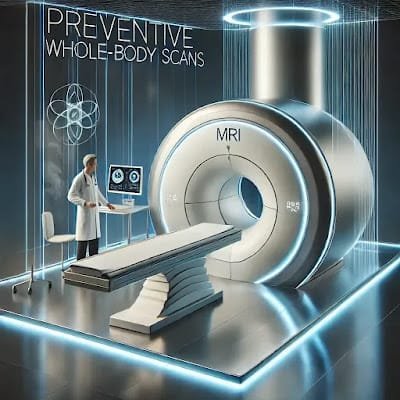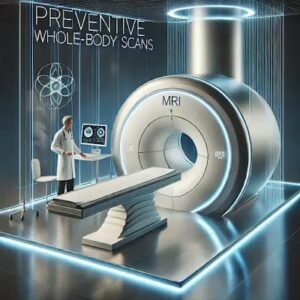Preventive Whole-Body Scans: The Future of Proactive Healthcare?
By|TN HEADLINES24
Introduction
In today’s fast-paced world, staying ahead of health issues has become a priority for many. Preventive whole-body scans, often powered by advanced MRI technology, are gaining traction as a revolutionary tool for early disease detection. These scans promise to uncover hidden health concerns, offering a glimpse into the future of personalized healthcare.
But are they worth the hype? In this article, TN HEADLINES24 delves into what these scans are, the technology behind them, their benefits and risks, and their accessibility in the U.S. and India.
What Are Whole-Body Scans?
Whole-body scans are non-invasive imaging procedures that examine the entire body for signs of potential health issues, such as cancer, cardiovascular diseases, or organ dysfunction. Unlike traditional medical check-ups, these scans provide a comprehensive overview of your internal health in one session.
These scans are particularly appealing to health-conscious individuals aiming to detect illnesses before symptoms arise, giving them a proactive edge in managing their well-being.
The Technology Behind Preventive Whole-Body Scans
Most preventive scans use Magnetic Resonance Imaging (MRI), a technology that creates detailed images of the body’s internal structures using magnetic fields and radio waves. Unlike X-rays or CT scans, MRIs are radiation-free, making them safer for frequent use.
Advanced software powered by artificial intelligence (AI) enhances the accuracy of these scans. AI algorithms can quickly identify abnormalities, enabling doctors to provide a faster and more precise diagnosis. In the U.S., companies like Prenuvo have adopted cutting-edge MRI technology, while in India, similar innovations are beginning to emerge, making these scans increasingly accessible.
Benefits of Preventive Whole-Body Scans
1. Early Detection of Diseases
Whole-body scans can detect illnesses like cancer or cardiovascular conditions in their nascent stages, even before symptoms appear. Early detection often leads to more effective treatments and better outcomes.
2. Peace of Mind
For individuals with a family history of chronic diseases, these scans offer reassurance by ruling out potential health risks.
3. Personalized Health Insights
The comprehensive data from a scan helps individuals make informed decisions about lifestyle changes, diet, and preventive measures tailored to their unique health profiles.
Potential Risks and Criticism
1. Overdiagnosis and Unnecessary Follow-Ups
Not every abnormality detected by a scan is life-threatening. However, identifying minor or benign issues may lead to unnecessary tests, treatments, and emotional stress.
2. High Costs
In the U.S., a single scan can cost between $2,500 and $3,000, making it inaccessible to many. In India, while the costs are lower, limited availability restricts widespread use.
3. Lack of Universal Recommendations
Many medical professionals argue that these scans are not essential for healthy individuals with no symptoms or risk factors. They caution against using them as a substitute for routine health check-ups.
Costs and Accessibility in the U.S. and India
In the U.S., services like Prenuvo and Ezra have made preventive scans more popular, but they remain expensive and are not covered by most insurance plans.
In India, diagnostic centers in metropolitan areas are beginning to offer similar scans at relatively affordable prices, ranging from ₹40,000 to ₹70,000 ($500 to $900). However, the availability is still limited, and awareness about their benefits is low.
TN HEADLINES24 INSIGHTS
At TN HEADLINES24, we believe preventive whole-body scans represent a pivotal step toward personalized healthcare. While the technology holds immense promise, the associated costs and risks mean these scans might not be suitable for everyone.
Are they the future of healthcare? The answer depends on advancements in affordability, accessibility, and awareness in countries like the U.S. and India.
TN HEADLINES24 READERS’ INSIGHTS
We’d love to hear from you!
Would you consider getting a preventive whole-body scan?
Do you think these scans are a valuable investment in health or an unnecessary luxury?
Share your thoughts in the comments below.
The Future of Preventive Healthcare
The future of preventive healthcare lies in making advanced diagnostics like whole-body scans more accessible and affordable. Innovations in AI and medical imaging technology could reduce costs and improve accuracy.
Moreover, governments and insurance companies may begin to recognize the value of these scans, offering subsidies or partial coverage to encourage their use. In India, growing healthcare infrastructure could bridge the gap, making these scans a mainstream option in the coming decade.
Preventive whole-body scans are not just a trend—they represent a shift in how we approach health, focusing on prevention rather than cure.
TN HEADLINES24 BOTTOM LINE
Preventive whole-body scans are a glimpse into the future of proactive healthcare, combining technology with early detection to empower individuals. While not without their challenges, their potential to save lives cannot be ignored.
Stay tuned for more insights on cutting-edge healthcare trends at TN HEADLINES24.
Let me know if you need further refinements or additional sections!
TN HEADLINES24 QUIZ|TEST YOURSELF
Topic: Preventive Whole-Body Scans
Test your knowledge about the technology and insights covered in our article!
1. What is a preventive whole-body scan primarily used for?
a) Treating chronic diseases
b) Detecting potential health issues early
c) Boosting physical fitness
d) Enhancing mental well-being
Answer: b) Detecting potential health issues early
2. Which technology is commonly used in whole-body scans?
a) X-rays
b) Ultrasound
c) MRI (Magnetic Resonance Imaging)
d) CT Scans
Answer: c) MRI (Magnetic Resonance Imaging)
3. What is one major criticism of whole-body scans?
a) They are painful.
b) They emit harmful radiation.
c) They may lead to overdiagnosis.
d) They are not widely available.
Answer: c) They may lead to overdiagnosis.
4. What is the approximate cost of a whole-body scan in the U.S.?
a) $500-$700
b) $1,000-$2,000
c) $2,500-$3,000
d) Free with insurance
Answer: c) $2,500-$3,000
5. What makes MRI scans safer than CT scans?
a) They are faster.
b) They do not use radiation.
c) They are more affordable.
d) They require no medical expertise.
Answer: b) They do not use radiation.
6. Which country is witnessing growing awareness of preventive scans?
a) United Kingdom
b) Japan
c) India
d) Australia
Answer: c) India
7. Which AI feature enhances the effectiveness of preventive scans?
a) Automated diagnoses
b) Predictive modeling
c) Image analysis
d) All of the above
Answer: d) All of the above
8. What is a potential emotional drawback of preventive scans?
a) Overconfidence in health
b) Stress from false positives
c) Fear of radiation exposure
d) Lack of clarity in results
Answer: b) Stress from false positives
9. What is a common reason people opt for these scans?
a) To replace traditional check-ups
b) To detect asymptomatic conditions
c) For cosmetic reasons
d) To reduce healthcare costs
Answer: b) To detect asymptomatic conditions
10. What is the potential future benefit of these scans?
a) Global insurance coverage
b) Cheaper and faster technology
c) Elimination of all diseases
d) Complete health automation
Answer: b) Cheaper and faster technology
TN HEADLINES24|VOCABULARY CHALLENGE
Topic: Healthcare and Technology Vocabulary
Expand your knowledge with these multiple-choice vocabulary questions!
1. What does “preventive” mean in healthcare?
a) Focused on early treatment
b) Focused on avoiding disease
c) Focused on managing existing conditions
d) Focused on cosmetic improvements
Answer: b) Focused on avoiding disease
2. What does “diagnosis” refer to?
a) Treatment of a disease
b) Identification of a condition
c) Prevention of an illness
d) None of the above
Answer: b) Identification of a condition
3. What does “non-invasive” mean in medical terms?
a) No surgery or internal procedures
b) Minimal pain during the procedure
c) Completely risk-free
d) Requires external medications only
Answer: a) No surgery or internal procedures
4. What is an “abnormality”?
a) A perfect condition
b) A deviation from normal
c) A state of wellness
d) An unknown symptom
Answer: b) A deviation from normal
5. What does “radiation-free” indicate?
a) Safe from harmful rays
b) Low-cost healthcare
c) Limited imaging capabilities
d) Use of minimal electrical power
Answer: a) Safe from harmful rays
6. What does “AI” stand for in healthcare?
a) Automated Integration
b) Artificial Intelligence
c) Advanced Imaging
d) Analytical Insights
Answer: b) Artificial Intelligence
7. What is “early detection”?
a) Identifying diseases before symptoms show
b) Treating diseases in their advanced stages
c) Delaying the onset of symptoms
d) Conducting multiple scans
Answer: a) Identifying diseases before symptoms show
8. What does “cost-effective” mean?
a) Affordable and efficient
b) Expensive but useful
c) Time-consuming but reliable
d) Completely free
Answer: a) Affordable and efficient
9. What does “personalized” mean in healthcare?
a) Customized for individual needs
b) Generic and widely applicable
c) Group-focused treatment plans
d) A premium healthcare option
Answer: a) Customized for individual needs
10. What is a “symptom”?
a) Evidence of disease or condition
b) A preventive measure
c) A healthcare professional
d) A type of scan
Answer: a) Evidence of disease or condition
Disclaimer:
The content, images, and quizzes provided in this article are for informational and educational purposes only and do not constitute medical advice. TNHEADLINES24 does not endorse specific medical procedures or technologies and recommends consulting a qualified healthcare professional for personalized advice. The information is based on available research and trends and may not reflect all individual circumstances. The image used is for illustrative purposes and does not depict real events or individuals. TNHEADLINES24 is not responsible for any decisions made based on this content. Always prioritize professional guidance for health-related concerns.


